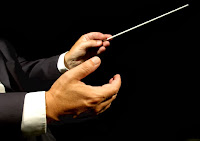COLOSSUS
anything colossal, gigantic, or very powerful
extraordinarily great
Colossus of Rhodes
~*~*~
Beethoven was the colossus,
a figure whose titanic energy and sublime originality
went on to define the cult of the hero-musician in the nineteenth century.
Even today in the 21st century Beethoven is still regarded as a titan of classical music.
And rightly so.
But today, about whom could this statement be said?
[Fill-in-the-blank] was the colossus,
a figure whose titanic energy and sublime originality
went on to define the cult of the hero-musician in the 20th century.
Sometimes when I asked students this question they are tempted to fill in their current favorite musician/group.
But, when they think about it they often end up choosing someone who has, if only by longevity in the music field, proved to be a colossus.
I find it interesting that in music, because of the very nature of the business, there can be found a colossus in every area not just composition as the above quote may imply.
However, if we focus only on composition there is, I believe, within this one area several divisions of composition that would have to be recognized: classical music, film or movie music, popular music, etc.
Another area of music in which a colossus might be found is conducting - this again could be divided into different types of conducting: choral/instrumental, symphony orchestra/Broadway orchestra, school ensemble/professional ensemble, etc.
Don't forget the actual performers of the music.
Vocal and instrumental areas would have to be divided by the seemingly infinite number of different types of vocalists and instrumentalists.
Even in music education there are those we call "master teachers."
They too could also be colossus.
It wearies my brain to even think about trying to name a colossus in any area given above.
Sure, there are those that I admire. Sit in on a few of my classes and their names will be very familiar to you.
I do believe that given time the "cream rises to the top" (as the old saying goes) and that longevity in and impact on whatever music area being explored does play into the labeling of someone as a colossus.
Everyone has their favorites.
But, who would you honor with the label "colossus?"











